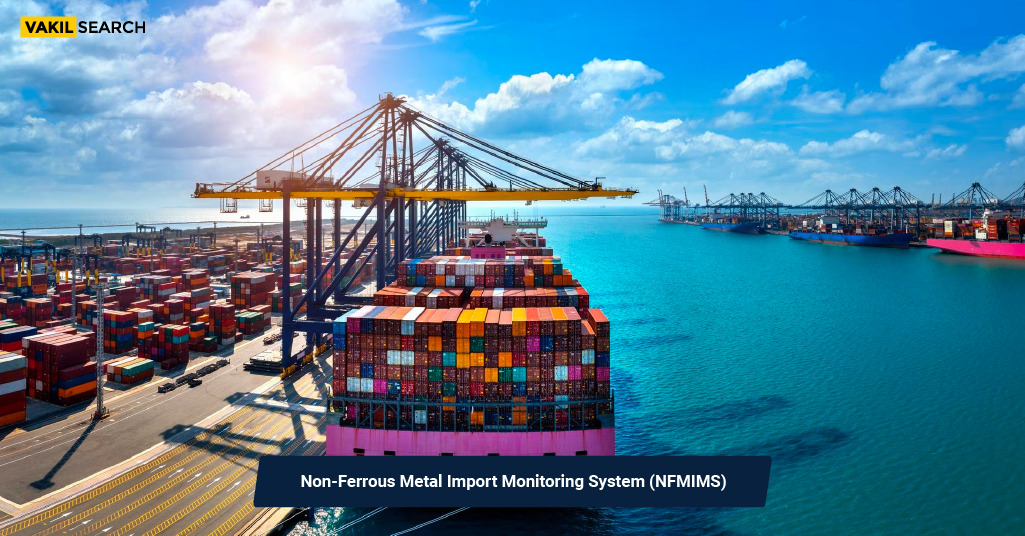Explore the intricacies of the Non-Ferrous Metal Import Monitoring System (NFMIMS), gaining valuable insights into monitoring, compliance, and regulatory aspects in this informative guide.
Overview
The Non-Ferrous Metal Import Monitoring System (NFMIMS) is an online system implemented by India’s Ministry of Mines to track the import of aluminium and copper. It was launched in 2021 and is mandatory for all importers of these metals.
What is NFMIMS Registration?
NFMIMS Registration is the mandatory process of obtaining clearance from the Government of India’s Ministry of Mines before importing specific non-ferrous metals into the country. It involves submitting essential details about the intended import through an online system, enabling the government to monitor and regulate the inflow of these metals.
Objective and Scope of NFMIMS
-
Objectives
- Gather Real-Time Data: Non-Ferrous Metal Import Monitoring System collects accurate and timely data on the import of covered non-ferrous metals, providing valuable insights into trade patterns and market dynamics.
- Enable Informed Policymaking: The comprehensive data gathered through NFMIMS assists the government in formulating effective policies related to:
- Import regulations
- Tariff adjustments
- Domestic production strategies
- Price stabilization measures
- Ensure Transparency and Compliance: The system promotes transparency in the import process and helps importers adhere to established guidelines.
- Protect Domestic Industry: By monitoring import volumes, NFMIMS can help safeguard the interests of domestic producers of non-ferrous metals, ensuring a level playing field.
-
Scope:
- Covered Metals: Currently, Non-Ferrous Metal Import Monitoring System applies to imports of:
- Aluminium: 43 items under HS code 76
- Copper: 46 items under HS code 74
- Importers: All importers of these metals into India must register with NFMIMS.
- Covered Metals: Currently, Non-Ferrous Metal Import Monitoring System applies to imports of:
Key Features and Benefits of NFMIMS
-
Features
-
- Online Registration: The registration process is entirely online, accessible 24/7, and involves minimal paperwork.
- Simplified Data Submission: Importers provide essential details such as:
- Type and quantity of metal
- Country of origin
- Port of entry
- Expected date of arrival
- Automatic Registration Number: A unique registration number is generated instantly upon successful submission.
- Paperless Process: No physical documents need to be submitted to any authority.
- Validity of Registration: Each registration is valid for a specific period, typically up to 6 months.
-
Benefits
- Enhanced Transparency: The system promotes openness and visibility in the import process.
- Improved Data Accuracy: Real-time data collection ensures more reliable information for decision-making.
- Timely Policy Interventions: The government can swiftly address any potential disruptions or imbalances in the market.
- Streamlined Import Process: The online system simplifies compliance and reduces administrative burdens for importers.
- Effective Data-Driven Policymaking: NFMIMS enables the government to formulate policies based on accurate and up-to-date information, fostering a more stable and efficient non-ferrous metals market in India.
Documents Required for NFMIMS Registration
To complete the Non-Ferrous Metal Import Monitoring System registration process, importers need to have the following documents readily available:
- Import Export Code (IEC): This 10-digit code issued by the Directorate General of Foreign Trade (DGFT) is mandatory for all import-export activities in India.
- Digital Signature Certificate (DSC): A Class II or Class III DSC is required to sign and submit the online application.
- Registration Cum Membership Certificate (RCMC): This certificate, issued by the appropriate trade association or export promotion council, is necessary for certain importers.
- Business Proof: This could be a copy of the company’s PAN card, GST registration certificate, or other relevant document.
- IEC Holder’s Aadhaar Card: The Aadhaar card of the person holding the IEC is required for verification purposes.
Role of NFMIMS in Policy Intervention
Non-Ferrous Metal Import Monitoring System plays a crucial role in facilitating informed policy interventions by the government in the non-ferrous metals sector. Here’s how it contributes:
- Real-Time Data: NFMIMS provides up-to-date information on import volumes, prices, and sources of supply, enabling the government to track market trends and identify potential issues.
- Early Warning System: The system can act as an early warning system for potential shortages or surpluses, allowing the government to take proactive measures.
- Trade Policy Formulation: The data collected through NFMIMS assists in shaping trade policies related to import tariffs, quotas, and other regulatory measures.
- Domestic Industry Protection: By monitoring import flows, NFMIMS can help safeguard the interests of domestic non-ferrous metal producers and ensure fair competition.
- Price Stabilization: The government can use NFMIMS data to identify and address price fluctuations, contributing to market stability.
Products Covered under NFMIMS
Currently, NFMIMS covers the following non-ferrous metals and their products:
-
Aluminium:
- Primary aluminium ingots
- Aluminium scrap
- Aluminium wires
- Aluminium plates, sheets, and strips
- Aluminium foils
- Aluminium tubes and pipes
-
Copper:
- Copper cathodes
- Copper scrap
- Copper wires
- Copper rods
- Copper tubes and pipes
- Copper plates, sheets, and strips
Who is Eligible for NFMIMS Registration?
All importers of aluminium and copper items falling under the specified HS Codes (76 and 74, respectively) are required to register with NFMIMS. This includes:
- Individual importers: Entities or individuals who import these metals for their own use or for commercial purposes.
- Traders: Businesses that import aluminium and copper for resale within India.
- Manufacturers: Companies that import these metals as raw materials for their manufacturing processes.
Implementation Date of NFMIMS
NFMIMS was implemented in two phases:
- Aluminum: The system came into effect for aluminium imports on April 12, 2021.
- Copper: NFMIMS was extended to cover copper imports from April 1, 2022.
FAQs
What is the cost associated with NFMIMS registration?
The cost of NFMIMS registration varies; please refer to relevant authorities or guidelines for specific fee details.
What is the time limit for completing NFMIMS registration?
Check NFMIMS guidelines for the stipulated time frame to complete the registration process.
Is a Sims certificate required for air shipments under NFMIMS?
Details on Sims certificates for air shipments under NFMIMS can be found in the guidelines. Review specific requirements for air cargo.
Can you explain the significance of QCO in the context of NFMIMS?
QCO (Quality Control Order) is crucial for ensuring quality standards for non-ferrous metals under NFMIMS. Compliance is essential for importers.
What does NFMIMS stand for, and what is the full form of its certificate?
NFMIMS stands for Non-Ferrous Metal Import Monitoring System. The full form of its certificate may vary; consult official documentation or authorities for details.
What is the validity period of an import license obtained through NFMIMS?
Check NFMIMS guidelines for information on the validity period of import licenses granted through the system.
What is the cost involved in obtaining a Sims certificate?
The cost of obtaining a Sims certificate may vary. Consult the Directorate General of Foreign Trade (DGFT) or relevant authorities for fee details.
Define Sims in customs and elaborate on its role in import processes.
Sims (Steel Import Monitoring System) in customs is a monitoring mechanism for steel imports. It ensures compliance with regulations and tracks steel imports.
What does Sims stand for, and how can I download my Sims certificate from DGFT?
Sims stands for Steel Import Monitoring System. To download your Sims certificate from DGFT, visit their official website or follow the specified procedure outlined in the guidelines.
Why is Sims registration necessary, and what is the fee for Sims in DGFT?
Sims registration is essential for monitoring steel imports. Check DGFT guidelines for specific reasons and the associated fee for Sims registration.
Conclusion
The Non-Ferrous Metal Import Monitoring System (NFMIMS) stands as a significant step towards enhanced transparency and data-driven policymaking in India’s non-ferrous metals sector. By requiring importers to register and provide advance information, the government can:
- Gather real-time insights into import trends and market dynamics.
- Formulate effective policies to regulate imports, protect domestic industry, and ensure price stability.
- Streamline the import process and reduce administrative burdens for importers.
NFMIMS has the potential to significantly contribute to the efficiency and stability of India’s non-ferrous metals market, fostering a more conducive environment for both domestic production and international trade.











